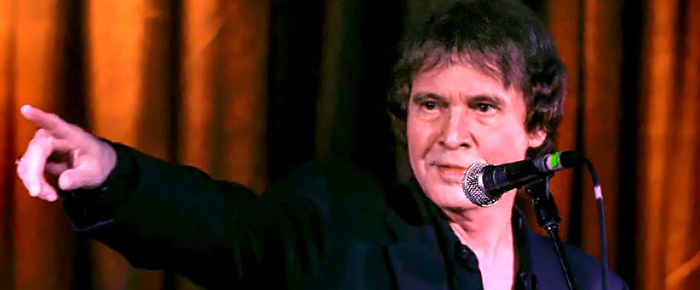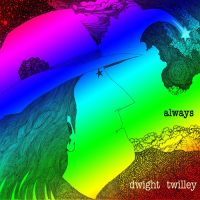
By Eleni P. Austin
Dwight Twilley has been recording music, with varying degrees of success for nearly 40 years now. In The pantheon of Power Pop, Twilley remains god-like for faithful fanatics of the genre.
The Tulsa, Oklahoma native formed a firm musical partnership with Phil Seymour after the two met following a screening of the Beatles’ “Hard Day’s Night” movie in 1967. Inspired, they began making music with guitarist, Bill Pitcock IV, forming a band called Oister.
As Twilley and Seymour began writing music together, their next step was recording their songs. It seemed too far-fetched to relocate to Los Angeles or New York, so the pair travelled to Memphis, Tennessee. They stopped at the first place that seemed like a recording facility, ironically, it was Sun Studios, Elvis Presley’s old stomping grounds.
They encountered Jerry Phillips, son of Sun Studios founder, Sam. He took the duo under his wing, sending them to the Tupelo, Mississippi studio of former Sun recording artist, Ray Harris. Twilley and Seymour credit Harris with adding a Rockabilly twang to their pretty Pop sound.
Ironically, when they did relocate to Los Angeles and sign with a record label, it was Shelter, the label co-owned by Denny Cordell and Tulsa musical legend, Leon Russell. Cordell convinced them that Dwight Twilley Band was a better name than Oister. Bill Pitcock joined them in L.A. and they began recording.
Their first single was the incendiary “I’m On Fire.” A perfect distillation of Power Pop crunch and Rockabilly swagger. The song was released in early 1975. Despite minimal promotion, it rocketed up the charts, peaking at #16. Unfortunately, Shelter was mired in legal difficulties, and their full-length debut Sincerely, didn’t arrive until 18 months later. By then, the momentum was lost the album was a commercial failure.
It was the beginning of a bad luck streak that would plague the band. They recorded a follow-up album in England that went unreleased. Luckily, Twilley and Seymour befriended fellow label-mates and kindred spirits, Tom Petty & The Heartbreakers. They provided backing vocals on Dwight Twilley Band’s next official release, Twilley Don’t Mind. Although it received great reviews, fame and financial success continued to elude the band. Phil Seymour left the line-up in 1978.
Twilley soldiered on alone, switching to the Arista label for his third album, Twilley and EMI for his fourth, Scuba Divers. By 1984, he briefly returned to the charts with the Top 20 hit, “Girls” from his fifth record, Jungle. His 1986 effort, Wild Dogs again went unnoticed.
Throughout the 1990s, Twilley maintained a low profile, but labels like DCC and The Right Stuff re-issued his early music, sparking a renewed interest and creating a new generation of fans.
By the turn of the century, Twilley seemed re-energized. He began writing and recording at a furious pace. Between 1999 and 2011, he recorded a number of great albums including Tulsa, The Luck, 47 Moons, Green Blimp and Soundtrack. He also managed to record a Christmas EP, a covers record, a Beatles tribute, and a live effort. He even released a series of rarities albums.
Now Dwight Twilley has returned with his 12th studio album, Always. Opening with the title track, Twilley’s first words are a call-back to his very first hit, “How long you gonna make me feel like I’m on fire/You’re wearin’ me out, but Baby Baby I’m not tired.”
Both “A Million Miles Wide” and “Lovers” have the stripped down, economical sound that recalls Twilley’s ‘70s output. The former weds a muscular back beat to stinging guitar riffs. The lyrics offer a sharp encomium to everlasting love. “But the love that lives inside, and the love that fills your mind/And the love you’ll keep til you die, is bigger than the sky, a million miles wide.”
On the latter, urgent synths pulse through the melody like heart beats. Rubbery bass lines, plinking piano keys and plaintive horn accents act like a wall of sound, insulating these clandestine lovers.
Twilley expands his sonic palette on three tracks. “Everybody’s Crazy” blends a countrified melody with kaleidoscopic guitar riffs that echo the Beatles at their most psychedelic. The moody atmospherics accentuate the desolate feeling of being alone in a crowd.
Twilley positively croons over the shivery “Moth To A Flame,” giving the song an early ‘50s patina. The lyrics explore our need to push the envelope, offering this hard won wisdom, “I’d really rather burn than be ignored, there’s a secret code to the crooked road, to places unexplored.”
Finally, “I See It In Your Eyes” is a tale of mutual attraction, powered by a sort of sideways “Skip-To-My-Lou” rhythm, jaunty piano fills and a spiraling guitar solo.
Everlasting love is the theme of this record. Twilley finds fresh ways to chronicle the long standing relationship he has with his wife Jan. “We Were Scared” is a soulful recollection of their early days.
On “Everyday”a thudding backbeat threads through a tapestry of shimmering organ and swirly guitar. Here Twilley seems grateful for the happy domesticity that cushions hard knocks of life. “Happy Birthday” is a tender tribute to the woman he has chosen to walk through life with.
Other interesting tracks include the rollicking 12 bar Blues of “Til The Jukebox Dies.” “Fools Like Me” is a sunny collision of gritty guitars, kick-drum rhythms, soulful harmonica and Doo-Wop harmonies. The album closes with the forward looking “Tomorrow.”
Sadly his original compatriots are no longer here to enjoy Twilley’s powerful resurgence. After two solo albums and a stint in the Textones, Phil Seymour tragically succumbed to lymphoma cancer in 1993. Bill Pitcock returned to play with Twilley from the late ‘90s until he died in 2011, following a long battle with cancer.
Dwight Twilley continues to thrive because he no longer relies on major labels or cities to support his career. Several years ago he returned to Tulsa and started his own label, Big Oak. Always confirms what Power Pop fanatics have always known, Dwight Twilley is a musical god.














































